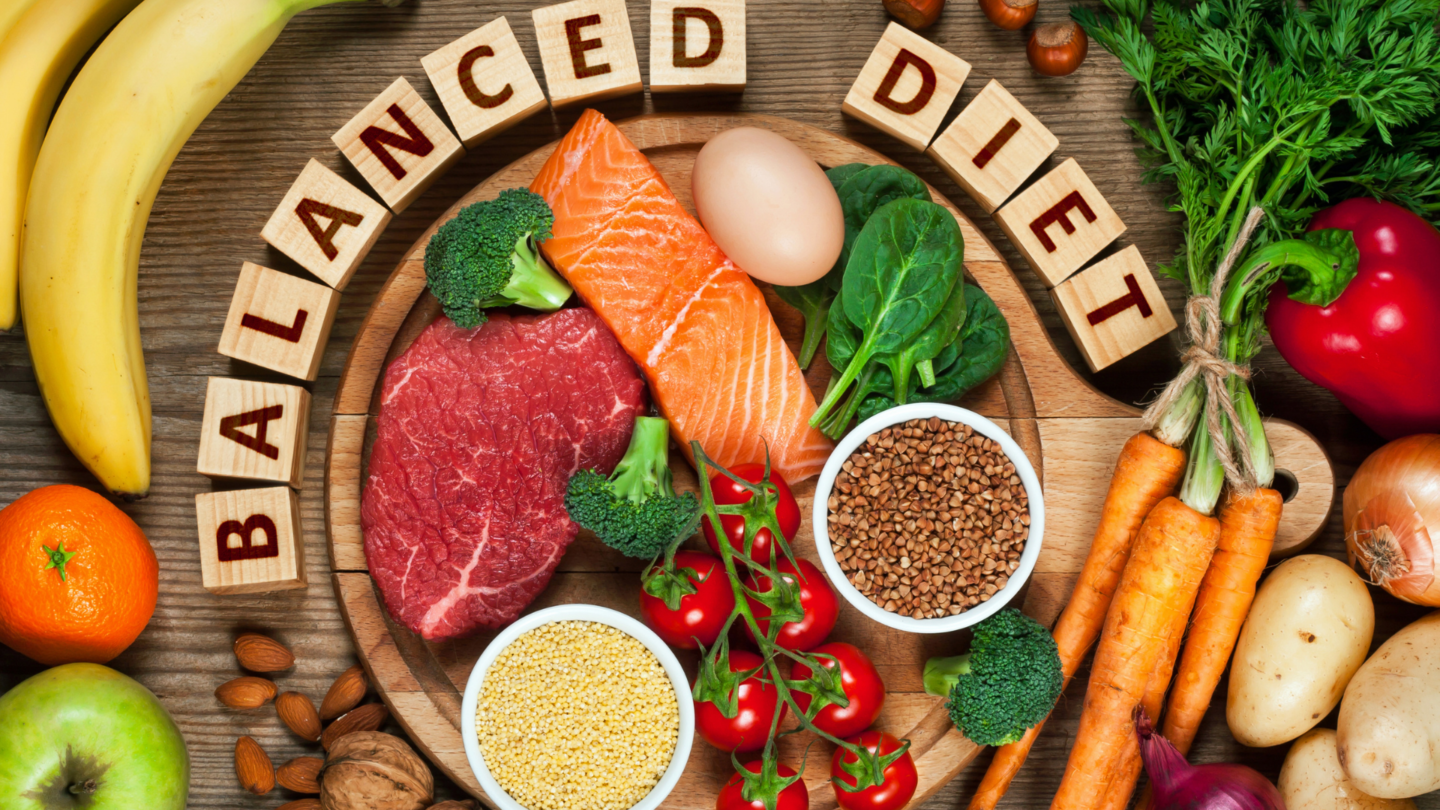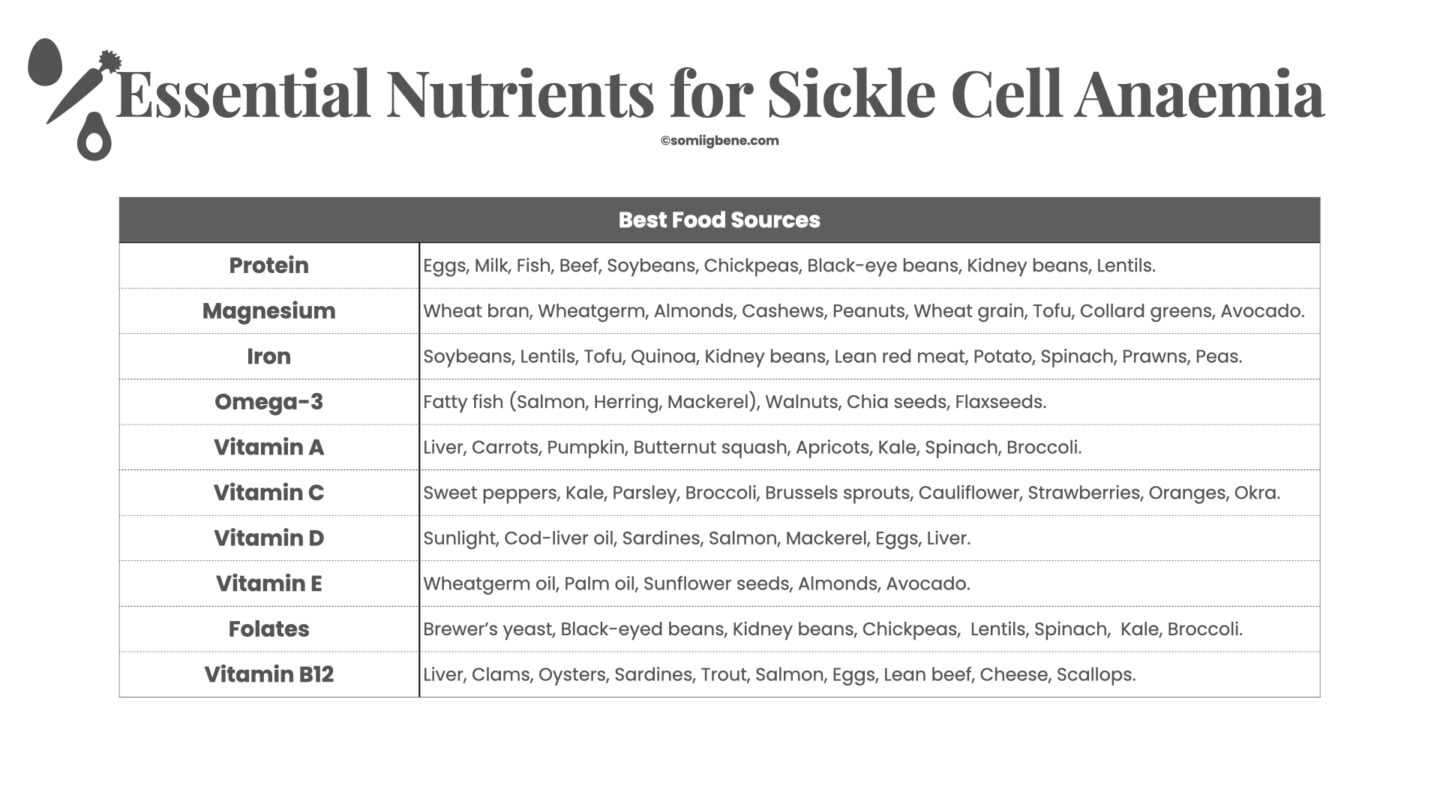
Have you often wondered if diet affects sickle cell disease?
If so, the short answer is yes – diet affects sickle cell disease.
That said, research into diet and sickle cell disease is limited. But current evidence shows that diet affects your growth, development, immunity and the severity of sickle cell crisis episodes.
In this blog post, I share the evidence for diet’s beneficial role in sickle cell disease, the nutrients you should eat in abundance, and tips to improve your diet and potentially reduce the severity of pain crises.
Let’s jump in!
How sickle cell affects your dietary needs
Scientists now know that sickle cell causes malnutrition due to hypermetabolism.
Not sure what that means? Let me explain.
Sickle cell causes your red blood cells to breakdown every 8-25 days rather than the average 100-120 days for normal red blood cells. This rapid breakdown causes your bone marrow to produce new red cells faster than average to compensate.
However, this process uses up lots of energy and protein and considerably increases your energy and protein needs. Your heart also works harder to supply enough oxygen to your cells and tissues because of your low red cell count (anaemia).
These factors increase your dietary protein and energy needs, which are, in fact, much higher than people with similar characteristics (age, weight, height, physical activity etc.) without the condition.
Studies also show that people with sickle cell have many micro-and macronutrient deficiencies that lower immunity, growth and general wellbeing.
Indeed, children who eat inadequate diets grow and develop poorly and often become short, thin adults. They are also more prone to infections and experience severe, frequent pain crisis.
And even when children eat diets with sufficient intakes according to the recommended daily dietary allowance for age and sex, it is still insufficient for their needs due to the higher nutritional demand imposed by the disease.
Without an optimal diet, your risk of malnutrition, low quality of life and severe, frequent pain crisis increases.
What nutrients are essential for people with sickle cell?
People with sickle cell have many micronutrient deficiencies including, vitamin A, B2, B6, B12, C, D and E, folic acid, iron, calcium, magnesium and zinc.
1 | Iron: Iron deficiency in people with sickle cell disease is uncommon. However, in developing countries, such as India, Jamaicaand Nigeria, some patients with sickle cell have low iron. Only 16% of patients with sickle cell in the US are iron deficient.
If your doctor hasn’t diagnosed you with iron deficiency, you mustn’t take iron supplements because excess iron can cause your red cells to breakdown faster, worsening anaemia and sickle cell crisis.
2 | Zinc: Zinc deficiency is prevalent in people with sickle cell, with up to 70% of adults with sickle cell zinc deficient. As well as low dietary zinc intakes, people with sickle cell excrete zinc rapidly.
Zinc is crucial for immune function, growth, wound healing and sexual maturation. Children with sickle cell grow slowly, are more prone to infections and start puberty later than their peers, possibly due to zinc deficiencies.
After 12 months of oral zinc supplements, growth and wound healing improve, and patients report fewer crisis and hospitalisations.
Other nutrients such as glutamine, L-arginine and antioxidants could provide significant therapeutic benefits in people with SCD.
3 | Magnesium: Not everyone with sickle cell has low magnesium. However, when magnesium is low, your risk of sickle crisis increases because your red cells become abnormally dehydrated.
Dehydrated red cells are very prone to sickling, which increases the risk of crisis and other complications like stroke and leg ulcers.
4 | Folate and B-vitamins: Folate is vital for red cell synthesis, and B-vitamins, in general, help release energy from food.
Medical doctors prescribe folic acid supplements to people with sickle cell mainly to prevent folate deficiency. However, scientists are unsure of its effectiveness because it doesn’t improve outcomes (number of pain crisis, infection rates or splenic sequestration) and may mask vitamin B12 deficiencies, common in sickle cell.
5 | Antioxidant vitamins: Blood levels of the antioxidant vitamins A, C and E are low in people with sickle cell anaemia, but there is no evidence for taking supplements. Vitamin A supplements can be toxic when taken in high doses over prolonged periods, so it’s best to avoid them.
6 | Vitamin D: Vitamin D deficiency is common with or without sickle cell. Up to 96% of people with sickle cell are vitamin D deficient.
Vitamin D deficiencies can increase the risk of respiratory and chronic diseases. People with sickle cell may have higher vitamin D needs due to higher metabolic rates. Consequently, vitamin D deficiencies lower bone density and increase bone fracture risk in people with sickle cell. It also increases the severity of pain crisis.
Correcting vitamin D reduces pain crisis severity.
7 | Omega-3 fats: Every cell in your body has a protective membrane. The more fluid the membrane, the healthier it is, and the more able it is to communicate with other cells and be controlled by other regulating hormones.
Omega-3 fats keep your cell membranes fluid and reduce the number of inflammatory molecules your cells produce.
Healthy cells have the correct balance of (anti-inflammatory) omega-3 fats and (inflammatory) omega-6 fats. Cells in sickle cell disease are abundant in omega-6 fats, with minimal omega-3 fats, especially EPA and DHA.
This imbalance makes cells more prone to sticking to blood vessels and causing pain crisis.
Studies in children and adults show that supplementing with omega-3 fats for at least six months significantly reduces the number of pain crisis and hospitalisations due to crisis.

What’s a healthy diet for sickle cell?
There are still no official diet recommendations for sickle cell anaemia, even though research now shows nutrition’s benefits.
However, eating a balanced diet rich in quality proteins and the micronutrients highlighted above is an excellent place to start.
The table below provides good food sources of these nutrients.

It is vital to eat a healthy, balanced diet if you have sickle cell. Such a diet comprises all food groups, including
- Whole grains and starchy vegetables (e.g., Brown rice, potatoes, yams, plantain, sweet potatoes),
- Non-starchy vegetables (e.g., Broccoli, okra, spinach, cauliflower),
- Proteins (e.g., Fish, legumes, lean meats, poultry, legumes, fish),
- Fruits (e.g., Mango, strawberries, oranges, banana),
- Nuts and seeds (e.g., Almonds, cashews, sunflower seeds, pistachios),
- Healthy whole fats (e.g., avocado, coconuts, olives)
Since you have higher energy and protein needs than people without the condition, your diet should ideally be energy-dense. The guideline intakes for healthy people are possibly unsuitable, with research suggesting you may need up to 21% more energy.
You can increase the energy density of your diet by eating larger portions of nutritionally balanced meals or adding larger quantities of whole, healthy fats from avocados, olives, coconut, nuts (almonds, cashews,) and seeds.
It is also necessary to increase the protein content of your diet.
Scientists are still unsure how much additional protein you need. But (mice) studies suggest that up to 35% of your energy needs should be protein-derived. Eating animal-based protein, including fish, lean meats, eggs and poultry, is the easiest way to achieve this because they are dense-sources of quality protein.
It may be worth prioritising fish, particularly fatty fish, as they are also excellent sources of anti-inflammatory omega-3 fats. Walnuts, chia seeds, and linseeds are good sources of omega-3 fats too.
A healthy diet should contain a good balance of plant and animal proteins. Plant foods provide antioxidants, vitamins, polyphenols, and fibre absent in animal foods and contribute to health.
As a guide, fill at least a quarter of your plate with non-starchy vegetables and the remainder with equal portions of whole grains and/or starchy carbs, quality proteins and healthy fats.
Now you know diet affects sickle cell disease.
I hope you are eager and ready to overhaul (or improve) your diet and make it a nourishing, healthy one.
It may be challenging if you’re used to eating processed foods or have a poor appetite. But remember, the more whole, nutrient-dense foods you eat, the more you energise and strengthen your body with the essential nutrients it requires to fight inflammation and support your metabolic needs.
Focus on changing or incorporating one thing at a time and at a pace that suits you. And before you know it, your diet will be full of nourishing foods that lower your risk of crisis and hospital stays.
You can do this!
REFERENCES
- Hyacinth, H.I., Adekeye, O.A., Yilgwan, C.S. (2013) Malnutrition in sickle cell anaemia: Implications for infection, growth, and maturation. Journal of Social Behaviour and Health Sciences, 7(1), doi:10.5590/JSBHS.2013.07.1.02.
- Hibbert, J.M., Creary, M.S., Gee, B.E., Buchanan, I.D., Quarshie, A., Hsu, L.L. (2006) Erythropoiesis and myocardial energy requirements contribute to the hypermetabolism of childhood sickle cell anaemia. Journal of Paediatric Gastroenterology and Nutrition, 43(5), 680–687.
- Mohanty, D., Mukherjee, M.B., Colah, R.B., et al., (2008) Iron deficiency anaemia in sickle cell disorders in India. Indian Journal of Medical Research, 127(4), 366–9.
- King, L., Reid, M., and Forrester, T.E. (2005) Iron deficiency anaemia in Jamaican children, aged 1–5 years, with sickle cell disease. West Indian Medical Journal, 54(5), 292–6.
- Odunlade, O., Adeodu, O., Owa, J and Obutor, E. (2019) Iron deficiency, still a rarity in children with sickle cell anaemia in Ile-Ife, Nigeria. Haematology, Transfusion and Cell Therapy, 41(3), 216–221.
- Koduri, P.R. (2003) Iron in sickle cell disease: A review why less is better. American Journal of Haematology, 73, 59–63.
- Prasad, A.S. (2002) Zinc deficiency in patients with sickle cell disease. American Journal of Clinical Nutrition, 75(2), 181–182.
- Zemel B.S., Kawchak, D.A., Fung, E.B., Ohene-Frempong, K., Stallings, V.A. (2002) Effect of zinc supplementation on growth and body composition in children with sickle cell disease. American Journal of Clinical Nutrition, 75(2), 300–7.
- Prasad, A.S., Beck, F.W.J., Kaplan, J., Chandrasekar, P.H., Ortega, J., Fitzgerald, J.T., and Swerdlow, P. (1999) Effect of zinc supplementation on incidence of infections and hospital admissions in sickle cell disease (SCD). American Journal of Haematology, 61, 194–202.
- Antwi-Boasiako, C., Kusi-Mensah, Y.A., Hayfron-Benjamin, C., Aryee, R., Dankwah, G.B., Kwawukume, L.A., Darkwa, E.O. (2019) Total serum magnesium levels and calcium-to-magnesium ratio in sickle cell disease. Medicina (Kaunas), 55(9), 547: doi:10.3390/medicina55090547.
- Brugnara, C. (2018) Sickle cell dehydration: Pathophysiology and therapeutic applications. Clinical Haemorheology and Microcirculation, 68(2-3), 187–204.
- Dixit, R., Nettem, S., Madan, S.S., Soe, H.H.K., Bl Abas, A, Vance, L.D., and Stover, P.J. (2018) Folate supplementation in people with sickle cell disease. Cochrane Database Systematic Review, 3(3), DOI: 10.1002/14651858.CD011130.pub3.
- Kamineni, P., Chirla, S., Dinh, K., Hasan, S., Nidhiry, E., Kwagyan, J., Naab, T., Lombardo, F., Castro, O., and Dawkins, F. (2006) Low cobalamin levels in African Americans with and without sickle cell disease. Journal of the National Medical Association, 98(3), 352–356.
- Soe, H.H., Bl Abas, A., Than, N.N., Ni, H., Singh, J., Bin Mohd Said, A.R., Osunkow, I. (2017) Vitamin D supplementation for sickle cell disease. Cochrane Database Systematic Review, 1(1), doi:10.1002/14651858.CD010858.pub2.
- Roth, D.E., Abrams, S.A., Aloia, J., et al., (2018) Global prevalence and disease burden of vitamin D deficiency: a roadmap for action in low- and middle-income countries. The New York Academy of Sciences, https://doi.org/10.111/nyas.12969.
- AIjama, A., AlKhalifah, M., Al-Dabbous, I.A., and Alqudaihi, G. (2018) Vitamin D deficiency in sickle cell disease patients in the Eastern Province of Saudi Arabia. Annals of Saudi Medicine, 38(2), 130–136.
- Arlet, J-B., Courbebaisse, M., Chatellier, G., Eladari, D., Souberbielle, J-C., Friedlander, G., de Montalembert, M., Prie, D., Pouchot, J., and Ribeil, J-A. (2013) Relationship between vitamin D deficiency and bone fragility in sickle cell disease: a cohort study of 56 adults. Bone, 52(1), 206–11.
- Lee, M.T., Licursi, M., and McMahon, D.J. (2015) Vitamin D deficiency and acute vaso-occlusive complications in children with sickle cell disease. Paediatric Blood Cancer, 62(4), 643–7.
- Razzaque, M.S. (2018) Magnesium: Are we consuming enough? Nutrients, 10: doi:10.3390/nu10121863.
- Daak, A.A., Ghebremeskel, K., Hassan, Z., Attallah, B., Azan, H.H., Elbashir, M.I., and Crawford, M. (2013) Effect of omega-3 (n-3) fatty acid supplementation in patients with sickle cell anaemia: randomised, double-blind, placebo-controlled trial. American Journal of Clinical Nutrition, 97:37–44.
- Rizvi, S., Raza, S.T., Ahmend, F., Ahmad, A., Abbas, S., and Mahdi, F. (2014) The role of vitamin E in human health and some diseases. Sultan Qaboos University Medical Journal, 14(2), e157–165.
- Buchowski, M.S., Chen, K.Y., Byrne, D., and Wang, W.C. (2002) Equation to estimate resting energy expenditure in adolescents with sickle cell anemia. American Journal of Clinical Nutrition


